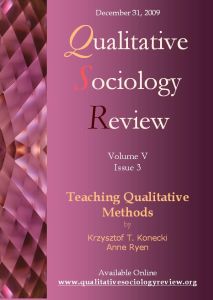“I’ve found more difficulties than I expected to”: Raising questions from field experience
DOI:
https://doi.org/10.18778/1733-8077.5.3.06Keywords:
Teaching qualitative methodologies, Field experience, Student feedbackAbstract
Sociology students in Portugal have usually been taught methodology and epistemology in a classical, scholastic way. If students are provided with practical contact early on, this can help them to better understand and apply theoretical concepts conveyed through lectures. During their last graduate year, Sociology students of the University of Minho are expected to design a full research project and to conduct exploratory research, completed by the last semester, and this includes either a residence period or a research seminar. To ensure this works well, methodology units are organised on a weekly basis, according to two types of classes: 1) theoretical and 2) theoretical-practical, with the purpose of gradually enabling students to develop the competencies they will need to graduate. Focusing on the teaching experience of qualitative methodologies, and using as an example the teaching of observation techniques, the purpose of this article is to illustrate the advantages of offering the students early contact with the “field”, and prepare them for future full-scale research. These advantages are acknowledged by students, as evidenced in their written evaluations of their field experiences. However, it is important to note that this type of learning is most fruitful when students have been previously trained in the use of the written language – namely aiming to develop their ability to describe – and social theories.
Downloads
References
Becker, Howard S. (1994) Métodos de Pesquisa em Ciências Sociais. São Paulo: Huitec.
Google Scholar
Blumer, Herbert (1969) Symbolic Interactionism. Englewood Cliffs: Prentice-Hall.
Google Scholar
Campenhoudt, Luc Van (2001) Introduction à l’Analyse des Phénomènes Sociaux. Paris: Dunod.
Google Scholar
Delyser, Deydia (2008) “Teaching Qualitative Research”. Pp. 233-244 in Journal of Geography in Higher Education vol. 32 (2).
Google Scholar
DOI: https://doi.org/10.1080/03098260701514074
Denzin, Norman K. (1997) Interpretive Ethnography: Ethnographic practices for the 21 st century. Thousand Oaks: Sage.
Google Scholar
DOI: https://doi.org/10.4135/9781452243672
Denzin, Norman K. And Lincoln, Yvonna S. (2000) Handbook of Qualitative Research. Thousand Oaks: Sage.
Google Scholar
Gonçalves, Carlos Manuel (2006) “Seminário: Relatório da disciplina”. Unpublished aggregation report, Department of Sociology, University of Porto, Porto.
Google Scholar
Janesick, Valerie J. (1998) Stretching Exercises for Social Researchers. Thousand Oaks: Sage.
Google Scholar
Sells, Scott; Smith, Thomas Edward and Newfield, Neal (1997) “Teaching Etnographic Research Methods in Social Work: A model course”. Pp 167-184 in Journal of Social Work Education vol. 33 (1).
Google Scholar
DOI: https://doi.org/10.1080/10437797.1997.10778861
Pinto, José Madureira (2007) Indagação Científica, Aprendizagens Escolares, Reflexividade Social. Porto: Afrontamento.
Google Scholar
Downloads
Published
How to Cite
Issue
Section
License

This work is licensed under a Creative Commons Attribution-NonCommercial-NoDerivatives 4.0 International License.











